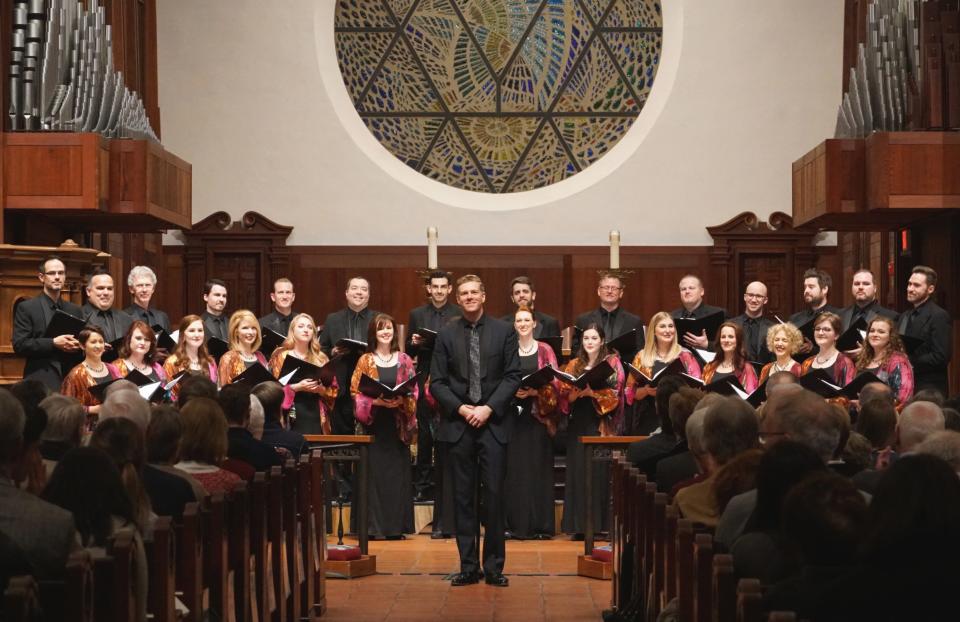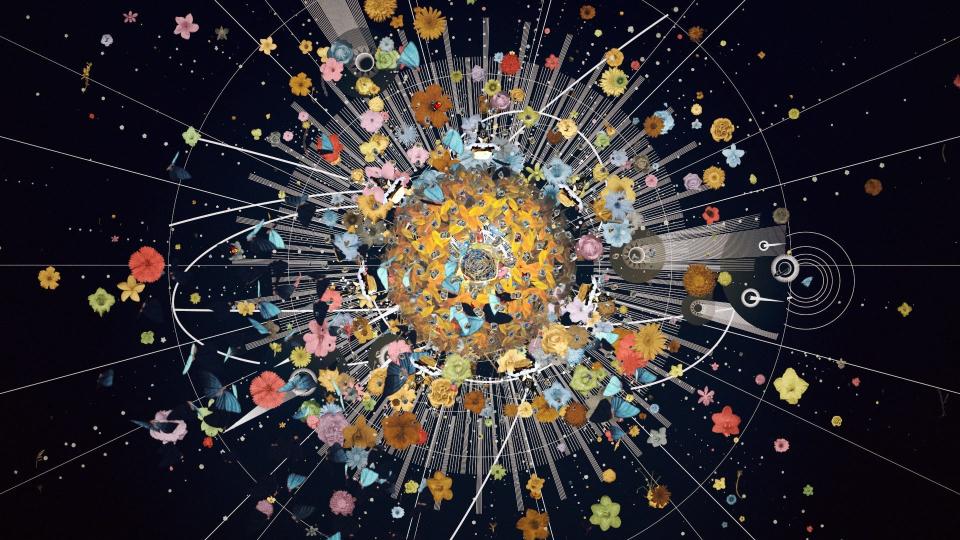With 'Mass for the Endangered,' a composer has written a hymn for climate absolution

Keeping up with the news can be overwhelming. All too often, front pages report school shootings, wartime invasions, economic woes, misconduct by those in power or the steadily worsening condition of our planet. Sometimes, it's all of those things at once.
People tuned in to the climate news cycle in particular have reported increasing levels of what psychologists now call "climate anxiety," or the mental stress caused by worrying about the wide-ranging consequences of global warming. Concerns about Earth's future habitability complicate major life decisions, such as whether young people feel it's wise to start a family or save for a house, changing the fabric of our societies.
A 2021 survey of 10,000 young people age 16 to 25 worldwide in the scientific journal The Lancet Planetary Health found that "climate change is a real dimension into (young people's) mental-health problems." A majority of respondents said climate change makes them feel sad, afraid, anxious, angry and powerless, and 45% said stress about government inaction to address the problem affects their daily lives. Only 36% agreed that government actions are aligned with climate science, and more than 60% felt that governments are failing young people and dismissing their distress.
Swedish activist Greta Thunberg's "Skolstrejk för klimatet" ("School strike for the climate"), a boycott of school on Fridays to protest climate inaction has seen increased participation around the world since August 2018 and is one manifestation of these frustrations. A growing number of lawsuits filed by young people insisting on greater environmental protection is another.
Climate series:The latest from Joan Meiners at azcentral, a column on climate change that publishes weekly
Climate change is stressful for those who stand to inherit the beleaguered Earth.
Sarah Kirkland Snider is a New Jersey-based composer who counts herself among climate anxiety sufferers. She has always felt most comfortable communicating with other people through music. So when she received a commission from Trinity Church Wall Street in New York City to "reimagine the Catholic Mass," she teamed up with friend, fellow nature lover and poet Nathaniel Bellows, to write a score that channels humanity's distress about the planet into a religious ritual of asking for forgiveness — not from God, but from nature.

"Music is a place where you can have cathartic experiences emotionally and deal with certain feelings that are under the surface or that you don't know how to deal with otherwise," Snider said.
"The most that I could really ask for as a composer (would be) to write something that gives somebody an outlet for feeling something or impels them to make a change in their actions, to strive to make a greater difference, or even just gives them a space to grieve or process that anxiety."
Snider and Bellows' six-part "Mass for the Endangered" will attempt to bring climate absolution to Arizonans on March 24 and 25, when it will be performed by the Phoenix Chorale at the Phoenix Art Museum. Tickets are $45 for adults, $23 for youth, $39 for seniors and military and can be purchased at https://phoenixchorale.org/concert/dominion/. The experience will include chamber orchestra accompaniment and animated visual projections by artist Deborah Johnson, also known as @candystations.
Rebooting the profound
Snider originally released "Mass for the Endangered" in 2020, but the pandemic prevented the performance tour from taking place. She used the travel funding to commission the video animations. With the visuals, which Johnson describes as "drawing from architectural elements of cathedrals and growing in dimension and complexity with each video," Snider hopes the experience may be transcendent.
"Climate anxiety is something that so many people I know feel on a near constant basis," Snider said. "Here in the northeast, we’ve had no snow this winter and it’s been very upsetting. It’s the first time in my life that we’ve had no snow in this area. And the ticks are now year-round and the flowers started coming up a month ago. There’s no denying that (life on the planet) is suffering more and more. It’s extremely distressing."
She mentioned growing up, going on long drives with her family when the windshield would end up covered in bugs. Now, she said, that rarely happens. Though she's not particularly fond of insects, she recognizes their absence as a major ecological problem.
"It's just terrifying to think of these species dying out because of human activity on the planet," Snider said. "Whether it's over-exploitation or habitat intrusion or poaching or climate change, the fact that we're culpable for all these other species dying out is just horrifying to me and really scary for so many reasons."

Warning signs exist outside of Snider's childhood memories. Scientist members of the Entomological Society of America published a special report in 2021 to address the "many inquiries about the validity of claims of rapid insect decline." Data on insects can be difficult to collect, funding is sparse and research efforts have been concentrated in more affluent parts of the world that are generally not hotspots of global biodiversity.
But some trends are detectable regardless. While the society members did not settle their internal debate on the exact number or percentage of species lost over time, they agreed that declines are drastic, not limited to insects and an urgent problem in need of solutions to keep ecosystems functioning.
"Even without much-needed monitoring and demographic data, enough is already known, based on first principles and records for amphibians, birds, flowering plants, mammals, reptiles, insects, and other taxa, to understand that a biodiversity crisis is accelerating as the planet’s human population grows, increasingly exacerbated by unprecedented recent climate changes and other anthropogenic stressors. Time is not on our side, and urgent action is needed on behalf of nature," the scientist authors wrote.
More:Welcome to a new year on a warming planet, now with 8 billion people
Snider is not traveling to all nationwide performances of her work but will be at the events in Phoenix. For her, endangering nature's biodiversity is both a personal and a professional affront. Since she was a child, she has gained inspiration for her musical compositions by taking long walks in nature. She sometimes feels she relates better to animals and the environment than to humans.
“It’s music and nature and walking and the three of those together were kind of my cathedral," she said.

From loss to love
The Rev. Doug Bland of Arizona Interfaith Power and Light, an organization that offers a spiritual response to the climate crisis, will attend Friday's performance and is looking forward to experiencing the cathartic release of grief for Earth's struggling nonhuman life while surrounded by fellow humans.
Rituals of lament are important for the human spirit, he said, and have taken many different forms throughout history and around the world.
"I think it was (Greek writer) Nikos Kazantzakis, who said that death is the spice that gives life its tasty sting," Bland said. "We really go blithely along every day and we don't think about how precious the gift of life is. That's another role that this mass is trying to help us recognize. It's not just facing how bad we are. But transformation comes when we grieve together and when we face the reality of our mortality."

He recalled the 2019 public funeral for the Ok's glacier ("Okjökull") in Iceland. It was rendered a lump of slush a tiny fraction of its former size by warming average temperatures caused by increased carbon in the atmosphere emitted by burning fossil fuels. Scientists, activists, dignitaries, farmers, journalists, children and Iceland’s Prime Minister, Katrín Jakobsdóttir, gathered to mourn, together, the loss of this longtime fixture of the landscape and what it might mean for life on nearby volcanic peaks and across the world.
At the foot of the glacier's shriveled temple, Jakobsdóttir announced that “the time has come not for words, not necessarily for declarations, but for action."
Bland agrees that, while taking the time to grieve with loved ones is important, the journey of asking forgiveness for sins against nature cannot end there, or at the curtain call of "Mass for the Endangered."
"I'm always thinking about who will be drawn to an event like this," he said. "Will they be kindred spirits who are concerned about the environment? Will this just be an aesthetic experience that titillates us and we find interesting for a while? Or will it be something that has the potential of being transformative? I think art has the capacity for doing that. But sometimes it just entertains. So how do we move from loss to love?"
More on climate and music:Making tree rings sing: Researchers find musical muse in forest climate data
Snider also hopes that those who attend the Phoenix performance will leave with more than a sense of cathartic release. She hopes they might be inspired to stay engaged and push for solutions despite the mental toll it sometimes takes. She thinks this could come in the form of caring about climate change and species loss while voting, donating to organizations that are trying to make a difference, supporting scientific research and making the effort to think about these issues as a whole, even when it's hard.
“I really think that activism has to come from an emotional place to begin with and so I’m just hoping to make an emotional connection with the listener, and then what they chose to do with that is up to them," she said.
Bland is simultaneously mourning the recent loss of his mother-in-law and celebrating the arrival of his second grandchild. He said his kids have debated whether to bring children into a world where the future is so uncertain.
To brighten that future, Bland works to bring awareness to bills at the Arizona Legislature related to climate action and protecting natural resources and the environment. He's been frustrated at the repeated dismissal by local lawmakers of bills that would make progress in that area and create a more livable planet for future generations. He hopes experiences like "Mass for the Endangered" can bring people together and into a mindset of cooperation on solutions to these shared problems.
Bills at the legislature:Environmentalists grow frustrated as lawmakers cast shade on bills instead of schools
"It's the pride and the envy and all those deadly sins that separate us as individuals," Bland said. "But it's the grief and the lament that might have the capacity to bring us together with each other and with the Earth."
Bland noted the last four written lines of "Mass for the Endangered:"
Lamb of God,they who rise fromall we lack—Lamb ofGod—give wonder, wish,give kindness back.
"It sounds like they're asking us to increase our capacity for wonder, for wishing for a better world," he said. "And, you know, the basic thing of kindness."
Joan Meiners is the Climate News and Storytelling Reporter at The Arizona Republic and azcentral. Before becoming a journalist, she completed a doctorate in Ecology. Follow Joan on Twitter at @beecycles or email her at joan.meiners@arizonarepublic.com.
Support climate coverage and local journalism by subscribing to azcentral.com at this link.
This article originally appeared on Arizona Republic: The Phoenix Chorale to sing a hymn for climate absolution

